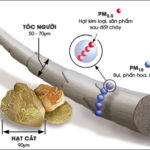Types of Sweet Breads
Some restaurants often add slices of sweet bread to meals for people to eat with soup or jam. Eating a small amount is fine, but eating too much can lead to various health problems, including obesity and cardiovascular disease.
The reason is that sweet breads often contain high amounts of sugar, which makes many people feel delicious but carries hidden health issues. Consuming excessive amounts of sugar can increase hunger after a short period of time, leading to overeating and uncontrollable weight gain.

Furthermore, sweet breads can suddenly increase blood sugar levels due to their high starch content. Consuming excessive sweet breads quickly converts starch into sugar in the body, causing a sharp rise in blood sugar. This stimulates the pancreas to produce insulin to lower blood sugar levels, which can eventually lead to diabetes.
It is best to avoid eating sweet breads. Instead, opt for whole grain breads made from brown rice, oats, or oats. They are not only rich in fiber and nutrients, but also do not cause a significant increase in blood sugar levels after consumption, making them suitable for weight loss and diabetes patients.
Sweet Drinks
Most types of sweet drinks, especially those containing sugar and caffeine, can have many health hazards if consumed excessively.
Since sweet drinks contain high sugar content, they can lead to weight gain and even obesity if consumed excessively. Obesity is related to serious health issues such as cardiovascular disease, diabetes, and metabolism. This also makes women lose confidence due to excessive appearance.

According to experts, sweet drinks are food with no nutritional value. They only contain calories without providing any nutrients to the body. Gradually, they will lead to excessive calorie consumption without ensuring enough important nutrients, contributing to malnutrition.
Additionally, the caffeine content in some sweet drinks also enhances alertness, causing insomnia. Excessive caffeine consumption can also cause anxiety, fatigue, and strong impact on both mental and physical health. It is best to drink fruit juice, filtered water, etc. to protect your health.
High-Sugar Desserts
To end the meal, we often eat desserts to satisfy our cravings. But you should think carefully about which desserts contain more sugar and avoid them. Not only rich in calories, sugar also contributes to the accumulation of fat in the body, creating a predisposition to many health issues such as cardiovascular disease, type 2 diabetes, and high blood pressure.
Consuming excessive sugar can cause harmful effects such as fat accumulation in the liver and high blood pressure, indirectly increasing the risk of heart disease. Consuming too much sugar also leads to oral problems, which are closely related to cardiovascular health.

Moreover, sweet treats can make us age prematurely. Eating too much sugar can destroy collagen and accelerate the aging process of the skin, leading to early wrinkles and saggy skin. According to research, people who consume sweet treats more than 7 times a week are more likely to have moderate or severe acne.
What You Need to Know About Chocolate
Despite its tasty flavor, there are long-standing concerns that eating too much chocolate may lead to weight gain and tooth decay. Despite this, chocolate continues to be a popular indulgence during holidays and a meaningful gift to share with loved ones. It is also a popular ingredient for beauty treatments.





































